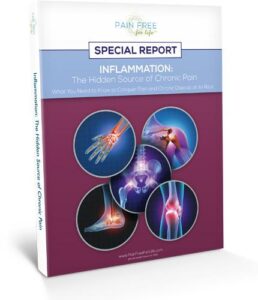
The inflammation-triggering ingredients of a classic holiday meal can be a challenge to maintaining a healthy diet if you have an autoimmune condition or suffer from chronic pain. And with the potential added stress of the holidays, the last thing you need is to suffer through an inflammation flare-up. This is especially true if you’re a parent or grandparent as the youngest members of your family are counting on you to make the magic of the season happen.
In many cultures, food takes center stage at holiday events. Still, it’s essential to know how these holiday inflammation flare up foods could negatively affect your health before you reach for another sugar cookie or dinner roll.
Because nutrition is critical to overall health and healing, we got to think about how we could support you in staying on track during the holidays and the meals that accompany them. In this blog, we will identify the top four culprits of inflammation on the holiday dinner table and provide you with some easy swaps that will allow you to celebrate without regret, aches, and pain down the line.
Our goal is to support you in staying healthy and out of pain so you can join in on all the fun and merriment.
Watch Out for These Four Inflammatory Foods to Keep Inflammation Under Wraps:
1.Trans Fats— A 2016 study found trans fats to be trigger inflammation. Found mainly in processed foods, trans fats are used to extend shelf life. Trans fats present a grave risk to your health as they have been found to increase blood pressure and contribute to the development of dementia.
Due to the mounting evidence that trans fats are a danger to human health, the FDA banned them in 2015, giving food manufacturers until 2018 to completely phase them out of their products. But here’s the kicker: there are still thousands of products lining grocery store shelves that contain trans fats as they were produced before 2018 and have a shelf life up until 2021—shocking right?
The fact that these foods are still kicking around years after they’ve been produced should be warning enough, but be sure to avoid the following holiday treats if you’re looking to keep your inflammation in check:
- Margarine
- Pastries
- Croissants
- Caramels
- Candies
- Premade pie crusts
If you see “partially hydrogenated” in the ingredients —stop right there; that’s a huge red flag that you are about to consume trans fats.
Luckily, many countries like Denmark, Switzerland, Canada, and Britain have banned or are looking to ban trans fats as more research shines a light on their dangers.
Low Inflammation Substitute: Use real butter in moderation instead of margarine. The butyric acid in butter has been proven to lubricate joints and actually reduce inflammation in the body. For a dairy free option, coconut oil or coconut butter can be used instead.
- Red and Processed Meats— As we discussed in our blog, Meat and Inflammation—The Shocking Connection, scientists have found an undeniable connection between red meat intake and the signs and markers of inflammation in humans.
Factory farmed red meat, and processed meat products tend to have more Omega-6s and less Omega-3s than the recommended 3:5 ratio endorsed by health bodies like the French Food Safety Agency.
Avoid these meat products at your holiday meal to keep inflammation from running rampant:
- Bacon
- Ham
- Some deli meats
- Sausage
- Salami
- Jerkies
Low Inflammation Substitute: If your family loves to enjoy a roast over the holidays, choose grass-fed beef instead. It’s a wiser choice if inflammation is a concern because it has a healthier ratio of Omega-6s to Omega-3s. This healthier balance is due to Alpha-linolenic acid, which is naturally found in the pasture grasses, nuts, and seeds that free-range cows graze on.
3. Refined Carbohydrates— A 2014 study found that diets high in refined carbohydrate-rich foods cause insulin resistance and a rise in inflammatory markers.
Unprocessed carbohydrates contain essential building blocks for your health like fiber, vitamins, and minerals. The real problem with carbohydrates arises when they are processed or milled. The point of milling grains is to improve shelf life and provide a more refined texture—but this process, unfortunately, strips them of their B vitamins, dietary fiber, and iron.
The lack of fiber in refined carbohydrates causes your body to digest them much too quickly, triggering a blood sugar spike that zaps you of energy and ignites body-wide inflammation.
Stay away from these holiday staples if you suffer from chronic pain, inflammation, or an autoimmune condition:
- White bread and rolls
- Crackers
- Pastries
- Waffles
Low inflammation substitute: If you plan to have waffles for breakfast on Christmas morning or dinner rolls with your New Year’s Eve roast, try making them from scratch and ditching the boxed mixes. Look for a recipe that includes whole grains instead of white flour. This way, you can still enjoy the foods you know and love but avoid the devastating blood sugar spikes, inflammation, and remorse. If you enjoy the flavour of pastries made with white flour, try subbing whole wheat pastry flour instead of all purpose whole wheat. It has a lighter flavour similar to white flour, but with the health benefits of whole wheat. Or, ditch the gluten altogether by using a gluten free flour blend.
4. Added Sugars— We saved the most significant holiday inflammation flare-up food for last, added sugars. Whether it be cookies, hot chocolate, cakes, candies, or fudge—every family has a favorite recipe for sweets to enjoy over the holidays. But don’t forget—sugar is also hiding in places you’d never expect, like bread rolls, crackers, and salad dressings.
Typically, when you eat food, insulin enters your blood—delivering sugar into your cells to give them energy. When you eat foods with added sugars, the surplus of insulin is stored in your fat cells, causing them to increase in size.
High-sugar foods also stimulate the production of free fatty acids in the liver. When your body digests these free fatty acids, the subsequent compounds can trigger an inflammatory reaction throughout your body.
Common high-sugar holiday foods:
- Cookies
- Cakes
- Candies
- Hot chocolate mixes
- Apple cider
- Eggnog
Low inflammation substitutes: Swap out sugary hot chocolate mixes and eggnog for a relaxing Holiday tea.
Suppose baking a batch of cookies is part of your family’s holiday tradition. In that case, try avoiding recipes with an excess of added sugars. In addition to sugar, you’ll want to avoid ingredients like dextrose, glucose, maltose, or sucrose.
Instead, look for a recipe that uses applesauce or pureed bananas as a sweetening agent. Your body will process these natural sugars much more effectively, and you won’t be up all night paying the price with the painful symptoms of inflammation.
You Deserve to Enjoy the Holidays
Living with a chronic health condition can be a lonely endeavor. It can feel like no one understands what you’re going through while you silently struggle—and this feeling can be amplified during the holidays.
We’re here to let you know you can still participate in family traditions and celebrations with a little ingenuity and awareness. Instead of focusing on the foods you cannot eat, decide to focus on all the delicious and healthy foods you can eat!
Making a few simple swaps and being aware of which foods may ignite inflammation are two excellent strategies that will ensure you continue making progress on your healing journey while joining in on all the holiday fun.
Keep Inflammation at Bay this Holiday Season and Beyond
If you’re ready to finally live a life free of the aches, pains, and disruptions associated with chronic pain and inflammation, we have an excellent resource for you.
Our free report takes you through the process of treating and eliminating inflammation at its root naturally. We’ve even included specific remedies and an entire section on microcurrent therapy.
To ensure a comfortable, happy, and pain-free holiday season, download the free report here:






